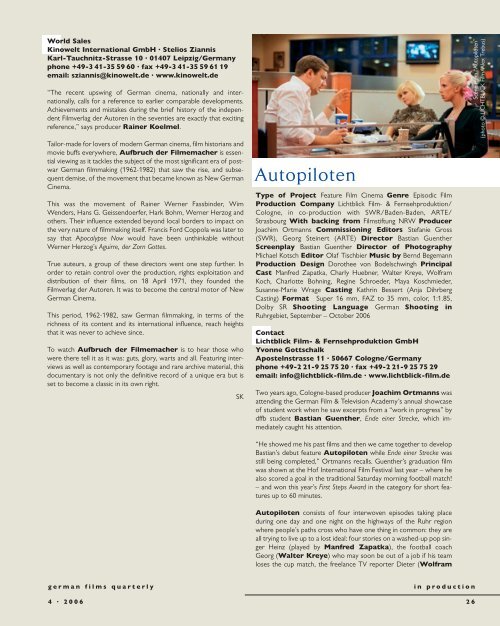Quarterly 4 · 2006 - German Cinema
Quarterly 4 · 2006 - German Cinema
Quarterly 4 · 2006 - German Cinema
You also want an ePaper? Increase the reach of your titles
YUMPU automatically turns print PDFs into web optimized ePapers that Google loves.
World Sales<br />
Kinowelt International GmbH <strong>·</strong> Stelios Ziannis<br />
Karl-Tauchnitz-Strasse 10 <strong>·</strong> 01407 Leipzig/<strong>German</strong>y<br />
phone +49-3 41-35 59 60 <strong>·</strong> fax +49-3 41-35 59 61 19<br />
email: sziannis@kinowelt.de <strong>·</strong> www.kinowelt.de<br />
“The recent upswing of <strong>German</strong> cinema, nationally and internationally,<br />
calls for a reference to earlier comparable developments.<br />
Achievements and mistakes during the brief history of the independent<br />
Filmverlag der Autoren in the seventies are exactly that exciting<br />
reference,” says producer Rainer Koelmel.<br />
Tailor-made for lovers of modern <strong>German</strong> cinema, film historians and<br />
movie buffs everywhere, Aufbruch der Filmemacher is essential<br />
viewing as it tackles the subject of the most significant era of postwar<br />
<strong>German</strong> filmmaking (1962-1982) that saw the rise, and subsequent<br />
demise, of the movement that became known as New <strong>German</strong><br />
<strong>Cinema</strong>.<br />
This was the movement of Rainer Werner Fassbinder, Wim<br />
Wenders, Hans G. Geissendoerfer, Hark Bohm, Werner Herzog and<br />
others. Their influence extended beyond local borders to impact on<br />
the very nature of filmmaking itself. Francis Ford Coppola was later to<br />
say that Apocalypse Now would have been unthinkable without<br />
Werner Herzog’s Aguirre, der Zorn Gottes.<br />
True auteurs, a group of these directors went one step further. In<br />
order to retain control over the production, rights exploitation and<br />
distribution of their films, on 18 April 1971, they founded the<br />
Filmverlag der Autoren. It was to become the central motor of New<br />
<strong>German</strong> <strong>Cinema</strong>.<br />
This period, 1962-1982, saw <strong>German</strong> filmmaking, in terms of the<br />
richness of its content and its international influence, reach heights<br />
that it was never to achieve since.<br />
To watch Aufbruch der Filmemacher is to hear those who<br />
were there tell it as it was: guts, glory, warts and all. Featuring interviews<br />
as well as contemporary footage and rare archive material, this<br />
documentary is not only the definitive record of a unique era but is<br />
set to become a classic in its own right.<br />
SK<br />
Autopiloten<br />
Type of Project Feature Film <strong>Cinema</strong> Genre Episodic Film<br />
Production Company Lichtblick Film- & Fernsehproduktion/<br />
Cologne, in co-production with SWR/Baden-Baden, ARTE/<br />
Strasbourg With backing from Filmstiftung NRW Producer<br />
Joachim Ortmanns Commissioning Editors Stefanie Gross<br />
(SWR), Georg Steinert (ARTE) Director Bastian Guenther<br />
Screenplay Bastian Guenther Director of Photography<br />
Michael Kotsch Editor Olaf Tischbier Music by Bernd Begemann<br />
Production Design Dorothee von Bodelschwingh Principal<br />
Cast Manfred Zapatka, Charly Huebner, Walter Kreye, Wolfram<br />
Koch, Charlotte Bohning, Regine Schroeder, Maya Koschmieder,<br />
Susanne-Marie Wrage Casting Kathrin Bessert (Anja Dihrberg<br />
Casting) Format Super 16 mm, FAZ to 35 mm, color, 1:1.85,<br />
Dolby SR Shooting Language <strong>German</strong> Shooting in<br />
Ruhrgebiet, September – October <strong>2006</strong><br />
Contact<br />
Lichtblick Film- & Fernsehproduktion GmbH<br />
Yvonne Gottschalk<br />
Apostelnstrasse 11 <strong>·</strong> 50667 Cologne/<strong>German</strong>y<br />
phone +49-2 21-9 25 75 20 <strong>·</strong> fax +49-2 21-9 25 75 29<br />
email: info@lichtblick-film.de <strong>·</strong> www.lichtblick-film.de<br />
Two years ago, Cologne-based producer Joachim Ortmanns was<br />
attending the <strong>German</strong> Film & Television Academy’s annual showcase<br />
of student work when he saw excerpts from a “work in progress” by<br />
dffb student Bastian Guenther, Ende einer Strecke, which immediately<br />
caught his attention.<br />
“He showed me his past films and then we came together to develop<br />
Bastian’s debut feature Autopiloten while Ende einer Strecke was<br />
still being completed,” Ortmanns recalls. Guenther’s graduation film<br />
was shown at the Hof International Film Festival last year – where he<br />
also scored a goal in the traditional Saturday morning football match!<br />
– and won this year’s First Steps Award in the category for short features<br />
up to 60 minutes.<br />
Autopiloten consists of four interwoven episodes taking place<br />
during one day and one night on the highways of the Ruhr region<br />
where people’s paths cross who have one thing in common: they are<br />
all trying to live up to a lost ideal: four stories on a washed-up pop singer<br />
Heinz (played by Manfred Zapatka), the football coach<br />
Georg (Walter Kreye) who may soon be out of a job if his team<br />
loses the cup match, the freelance TV reporter Dieter (Wolfram<br />
german films quarterly in production<br />
4 <strong>·</strong> <strong>2006</strong> 26<br />
Scene from “Autopiloten”<br />
(photo © LICHTBLICK Film/Alex Trebus)
















